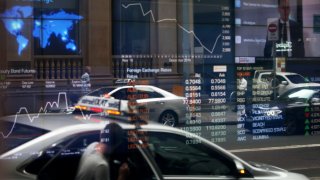
- Global interest rates continue to climb on expectations of faster central bank tightening, according to Tapas Strickland, director for economics and markets at the National Australia Bank.
- Japan's central bank left its short-term interest rate target unchanged at -0.1%, in line with market expectations, but raised its near-term inflation expectations.
- Elsewhere, Chinese President Xi Jinping cautioned against a rapid rise in interest rates on Monday that could derail the global recovery from the coronavirus pandemic.
SINGAPORE — Asia-Pacific markets lost momentum Tuesday as major indexes across the region erased earlier gains, but oil prices trended higher. Chinese mainland shares also advanced.
The session followed a quiet day on Wall Street where the U.S. markets were closed for a public holiday.
In Japan, the benchmark Nikkei 225 fell 0.27% to 28,257.25 and the Topix index was down 0.42% to 1,978.38.
Get Southern California news, weather forecasts and entertainment stories to your inbox. Sign up for NBC LA newsletters.
Japan's central bank left its short-term interest rate target unchanged at -0.1%, in line with market expectations, and said it will purchase a necessary amount of Japanese government bonds such that the 10-year JGB yields will remain at around 0%.
The Bank of Japan also raised its near-term inflation expectations: for the fiscal year starting in April, inflation forecast was raised from an earlier estimate of 0.9% to 1.1%. For fiscal 2023, inflation expectation was raised from 1% to 1.1%.
Still, those figures remain below the central bank's inflation target of 2%. Unlike global peers such as the U.S. Federal Reserve, BOJ said it will continue with its quantitative and qualitative monetary easing with yield curve control for "as long as it is necessary" to achieve and maintain the 2% inflation target.
Money Report
Hong Kong's Hang Seng index lost 0.43% to 24,112.78, while the tech-focused Hang Seng Tech index dropped 0.45% to 5,698.54.
Australia's ASX 200 fell 0.11% to 7,408.80 as the heavily weighted financials subindex faltered 0.29%.
South Korea's Kospi index dropped 0.89% to 2,864.24 and the Kosdaq declined 1.46% to 943.94. In India, the Nifty 50 retraced earlier losses and traded near flat in the afternoon while the Sensex ticked higher by 0.12%.
Chinese mainland shares bucked the broadly downward trend: The Shanghai composite rose 0.8% to 3,569.91 while the Shenzhen component added 0.19% to 14,391.39.
Global interest rates continue to climb on expectations of faster central bank tightening, according to Tapas Strickland, director for economics and markets at the National Australia Bank.
"As for central bank pricing, markets now fully price four rate hikes from the US Fed in 2022, and the timing of the first ECB rate hike has been brought forward to September. The exception is China with the [People's Bank of China] cutting rates by 10bps yesterday amid an uncertain growth outlook," he wrote in a Tuesday morning note.
Chinese President Xi Jinping cautioned against a rapid rise in interest rates on Monday that could derail the global recovery from the coronavirus pandemic.
"If major economies slam on the brakes or take a U-turn in their monetary policies, there would be serious negative spillovers," Xi said via videoconference at The Davos Agenda virtual event.
"They would present challenges to global economic and financial stability, and developing countries would bear the brunt of it," he said, according to an English translation of his remarks.
He also called for countries to move away from a "Cold War mentality," saying history has repeatedly shown that confrontation only invites disastrous repercussions.
China outlook
In the previous session, Asia markets had a muted reaction to official data out of China, which showed the world's second-largest economy grew faster than expected between October and December.
Strickland pointed out that the outlook for China's economy has "much more uncertainty," and that the country's zero-Covid policy is "dragging on the economy, and add to that the lost momentum due to problems in the property sector."
The country's state planner said Tuesday that China has "relatively plenty" of policy tools in reserve to deal with a challenging year ahead, and that it will roll out these measures in a timely manner to stabilize growth, Reuters reported.
Currencies and oil
In the currency market, the U.S. dollar rose 0.04% to 95.297 against a basket of its peers, after climbing from levels below 95.00 in the previous week and recovering from a session low of 95.129.
The Japanese yen changed hands at 114.83, weakening from an earlier level around 114.43. The Australian dollar gave up gains and fell 0.12% to $0.7201.
Oil prices rose sharply during Asian trading hours, with U.S. crude advancing 2.05% to $85.54 a barrel while the global benchmark Brent added 1.62% to $87.88.
The Organization of the Petroleum Exporting Countries, or OPEC, is due to release its monthly oil market report on Tuesday where traders are likely to watch for signs that global oil demand has been affected by the surge in Covid cases around the world.






